第三版大学英语1Unit 3
- 格式:doc
- 大小:160.50 KB
- 文档页数:14
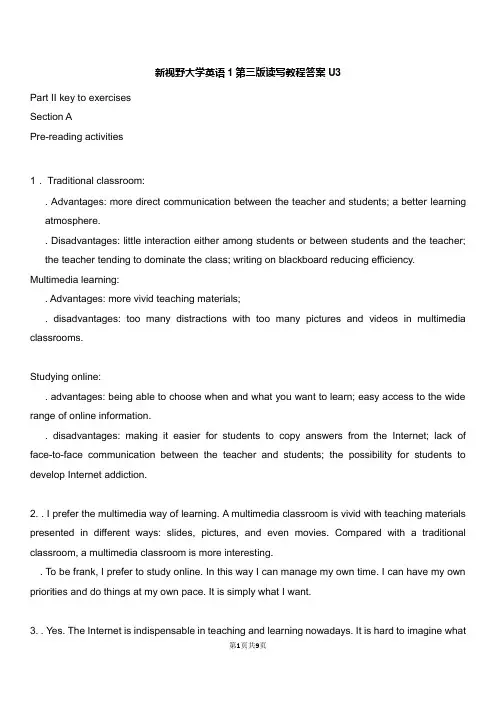
新视野大学英语1第三版读写教程答案U3Part II key to exercisesSection APre-reading activities1. Traditional classroom:. Advantages: more direct communication between the teacher and students; a better learning atmosphere.. Disadvantages: little interaction either among students or between students and the teacher;the teacher tending to dominate the class; writing on blackboard reducing efficiency. Multimedia learning:. Advantages: more vivid teaching materials;. disadvantages: too many distractions with too many pictures and videos in multimedia classrooms.Studying online:. advantages: being able to choose when and what you want to learn; easy access to the wide range of online information.. disadvantages: making it easier for students to copy answers from the Internet; lack of face-to-face communication between the teacher and students; the possibility for students to develop Internet addiction.2. . I prefer the multimedia way of learning. A multimedia classroom is vivid with teaching materials presented in different ways: slides, pictures, and even movies. Compared with a traditional classroom, a multimedia classroom is more interesting.. To be frank, I prefer to study online. In this way I can manage my own time. I can have my own priorities and do things at my own pace. It is simply what I want.3. . Yes. The Internet is indispensable in teaching and learning nowadays. It is hard to imagine whatit would be like without the Internet. We would have no easy or quick way to learn about the latest development of teaching and learning. We would miss the many interesting online courses; we couldn’t communicate effectively with teachers after class. We just can’t afford to lose the Internet. . No. teaching and learning had been carried out long before the Internet came into being. And people did just as well without the Internet or the computer. It is true that the Internet makes teaching and learning more convenient and more efficient, but it is by no means indispensable. I’m sure we can still teach or learn without the Internet.Reading comprehensionUnderstanding the text1.1. A fleet of laptops, smartphones and Internet connectivity 24 hours a day.2. wireless Internet access anywhere and anytime on campus.3. because smartphones could draw students’ attention and encourage sophisticated thinking.4. because too much time online can mean too little time I real-life studying or exercising or visiting with friends. If we spend too much time online, we will be cut off from the real world.5. they used the money to wire dorms with high-speed connections and equip their campuses with Wi-Fi networks.6. Becausethe university was afraid that it’s tech nology was not as advanced as that of other universities, it gave away free Apple iPads to compensate for its inferiority in this aspect.7. If a university can’t keep up with the rest f the world, or if it can’t provide high-bandwidth information as expected, it will be at a competitive disadvantage.8. it is mainly because they want to provide students with the most advanced free system.Critical thinking21 .Yes, I think so. Internet access is a must on campus. We students need the Internet to do research for our study, to obtain information to broaden our knowledge of the world, to communicate with family and friends, and to enrich our lives in our spare time.. No, I don’t think so. There are many potential disadvantages if Internet access is so ea sily accessible on campus. Some students may waste too much time I playing online games or chatting online, be tempted to visit “unhealthy” websites, or even become Internet-addicted and neglect their study.2 .It sounds like an awful idea to me. Obtaining knowledge is only part of learning. Learning not only gives us a wealth of knowledge, it also provides us with great vision, strong principles, social abilities, good manners, interpersonal skills and many more valuable attributes. This obviously cannot be realized by learning at home only with the computer..I think it is a good idea that students can study at home via the Internet in the future. Learning would become more flexible and accessible. This way, college education could become available to many more people, old or young, near or far, healthy or handicapped.3 . The Internet and smartphones have become an indispensable part of our daily life because they don’t cost much and they make communication much more convenient. We can talk to people, o r leave them messages almost anywhere and anytime. And very often we will get responses in no time.. With the Internet and smartphones becoming more and more popular, we are forgetting how to write with a pen or how to talk with people face to face. The more we use the Internet and smartphones, the less we meet our friends in real life. Even when friends meet face to face, instead of talking with each other, they all look at their smartphones, checking email or posting something on WeChat.4 .Life would be unimaginable without the Internet or smartphones. I depend on them to do everything, from study to communication, from shopping to entertaining. Without the Internet, the backing systems, the communications systems, in fact all key aspects closely related to peoples’ life will collapse. Life without the Internet would be terrible and simply unimaginable..Actually, I wouldn’t mind having a life without the Internet or smartphones. Without them, I would meet my family and friends face to face and spend more quality time together. I might take up some interesting hobbies or try something new. So, without them life might become even more colorful.Language focusWords in use31. competitive2. transform3. typical4. response5. adopted6. focused7. compensate8. analyze9. regulate10. estimateword building4Words learned new words formed -ry sceneryscene machinery-ivedetective detectcompare comparative explodeexplosiverepresent representative-izeModern modernize Character characterize Special specialize Computer computerize Summary summarize51. scenery2. machinery3. summarize4. specializes5. massive6. detect7. representative(s)8. characterize9. comparative10. modernize11. explosive12. computerizedbanked cloze61J 2H 3L 4N 5F 6I 7E 8A 9C 10OExpressions in use71. fired off2. keep up with3. set up4. account for5. stand out6. add to7. take the lead8. at a disadvantage9. in large part10. visit withstructured writing9It is not uncommon to see teenagers smoking today. Some of them smoke because of peerpressure. When they see some of their friends smoking, they feel the pressure to try it out in order to “fit in” with the crowd. Some other teenagers smoke because they w ant to imitate adults or appear to be mature. Teenagers like to imitate their favorite stars and adults around them. So, parents who smoke may set a bad example for their children. In conclusion, the causes of teenager smoking can be attributed to peer pressure and their intention to look like adults.Translation10伦敦地铁是英国的一个快速交通运输系统,服务于大伦敦的大部分地区。
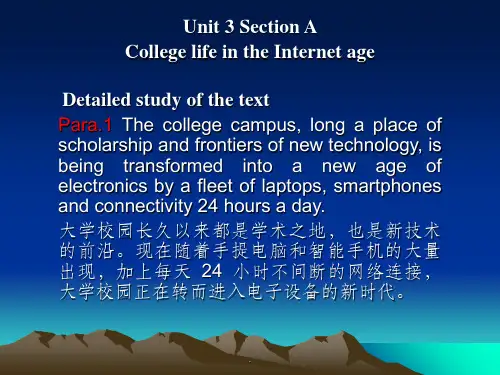
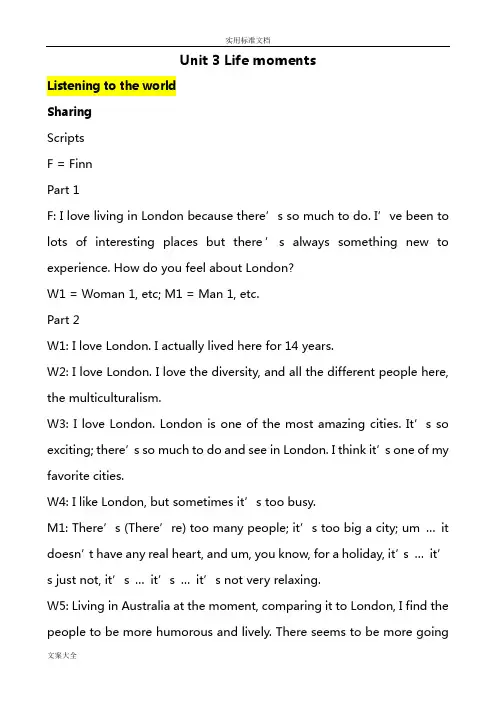
Unit 3 Life momentsListening to the worldSharingScriptsF = FinnPart 1F: I love living in London because there’s so much to do. I’ve been to lots of interesting places but there’s always something new to experience. How do you feel about London?W1 = Woman 1, etc; M1 = Man 1, etc.Part 2W1: I love London. I actually lived here for 14 years.W2: I love London. I love the diversity, and all the different people here, the multiculturalism.W3: I love London. London is one of the most amazing cities. It’s so exciting; there’s so much to do and see in London. I think it’s one of my favorite cities.W4: I like London, but sometimes it’s too busy.M1: There’s (There’re) too many people; it’s too big a city; um …it doesn’t have any real heart, and um, you know, for a holiday, it’s …it’s just not, it’s …it’s …it’s not very relaxing.W5: Living in Australia at the moment, comparing it to London, I find the people to be more humorous and lively. There seems to be more goingon.M2: Absolutely love London. One of the best places, I think, anyone can live. There’s just so much happening, I mean. Um, my father’s just over for two weeks and (has) actually been going down to all the galleries and stuff today along the South Bank.W6: I feel very comfortable in London. It’s already, like, my fifth time. M3: I wouldn’t like to live in London, but to visit, it’s an absolutely tremendous place and where I live it’s just a short train ride.M4: I do like London. I really like the old architecture and the history that they have here. There’s a lot to see and it’s just a really nice city.M5: London’s a very nice city. It takes a lot to get used to.M6: I like London very much. I like London because of its huge diversity of people, and huge diversity of things to do and places to see.Part 3F: What’s the most exciting thing you’ve done in London?W3: The most exciting thing I’ve done in London recently is to see Oasis live. I went to the Roundhouse and it was the most amazing concert. It was free, so we ended up having nice passes, so we were close to the band and it was incredible. It’s the best thing I think I’ve seen in a long time.W2: I’ve been to the theater quite a lot in London. I went to see Waiting for Godot at the National.W5: I’ve recently been to Hampton Court, which is a royal palace mostfamously known for being the place where King Henry VIII lived, and a few of his wives that made it there.M3: I …I think T ate Modern is the best place I’ve been to, you know, because it’s …it’s different every time …Um, you know, they really push the boundaries of, you know, the displays, compared to a lot of the traditional museums and art galleries in London.M5: The best thing I’ve ever done was watching a gig in Hyde Park for my cousin’s birthday.W4: The most exciting thing I’ve done in London? Um, I’ve watched England play football at Wembley –that was quite exciting.M2: Just this weekend, we were in er, Brixton, in Brockwell Park, and there was a country fair going on and just the characters in the crowd were just absolutely fantastic.M4: I’ve done a lot of interesting things. I’ve had a lot of good experiences here but probably the best thing was when I went to Wimbledon this year. Um …I got to watch …I got to watch Andy Murray on Center Court. I managed to get tickets to that. And it was just a really good atmosphere and it was a good example of, sort of, British culture and sport.ListeningScriptsThis happened in Australia …when I was about 25. I spent a fewdays at a hotel in Alice Springs and went to Ayers Rock and …Well, anyway, one day, I went out for a walk …in the outback. It was a lovely day so I walked and walked …and then I realized I didn’t really know where I was. I was a bit stupid, really …because I decided to go further …I guess I thought I’d find the way back. Um …anyway, after that I heard some dogs. First I heard them barking, and then I saw them …There was a group –maybe five or six dogs, wild dogs, coming towards me. I felt really frightened, but I remembered some advice I, I, er …um, I …I read in my guidebook: Don’t move, and don’t look at the dogs. So I froze, like a statue …I didn’t move …and I looked at a tree, not at the dogs, and didn’t move my eyes. The dogs were all around me, jumping and barking …I thought they were going to bite me. Then one dog did bite my arm, just a little, but still I didn’t move. In the end, after about 20 minutes, the dogs went away. I stayed there for a few more minutes and then luckily found my way back to the hotel. It was the most frightening experience I’ve ever had!ViewingF = Francesco; M1 = Mamas; M2 = MariaF: Kalimera. Kalimera. Er, can you show me around Crete?M1: Yes.F: This is the biggest Greek island of all, so I’ve got a local guide for the next two days.M1: Francesco, do you want to see a Cretan wedding?F: Oh, great! Traditional Cretan weddings can be incredible. Preparations often last days. Mamas is taking me to meet the bride, Maria Skula.F: Kalimera, Francesco.M2: Welcome! Come in.F: Congratulations!M2: Thank you.F: Are you a little nervous?M2: A little.F: All the women are helping prepare for the wedding feast. They’re making decorations in dough for a special wedding bread. How many guests for your wedding?M2: Er, 1,500 about (about 1,500).F: Mamma mia, it’s a lot! Mamma mia. The whole of Maria’s village has turned out to see her get married. The bride arrives with her father. She’s gorgeous. This is the nervous bridegroom, Jorgos. In a few minutes he and Maria will be man and wife.M2: I do!F: And now we go to party. It’s certainly the largest wedding reception I’ve ever been to. At Cretan weddings, guests give money as gifts. And now the food is served. The meat of 150 sheep ... and a whole lot more. Maria and Jorgos’first dance as man and wife includes all the close family. I’m destroyed! Ah, really.Speaking for communicationRole-playScripts1A: Hello.B: Hi, Sean. It’s Debbie.A: Hi, Debbie. What’s up?B: Is Kevin there?A: No, he’s not. He went out about 10 minutes ago.B: Oh …A: What’s up?B: Well, I locked the keys in the car. Kevin has the spare key. A: Oh, what a drag!B: Could I leave a message for him?A: Of course.B: Just ask him to call me.A: On your mobile?B: No, that’s in the car …I’ll give you a number.A: Hold on …OK, go ahead.B: OK, let’s see …It’s 3-double 2, 6-3, 2-8.A: Got it. I’ll tell him.B: Thanks, bye.A: Bye.2A: Berkley Bank.B: Hello. Could I speak to customers, please?A: Just a moment.C: Customers.B: Hello, I’ve got a problem. I think I’ve lost my credit card.C: I see. I’m sorry, this line is very bad. Where are you calling from? B: I’m in Madrid, actually. In fact, I’m calling from a public phone and I’ve only got one minute on this card. Could you ring me back?C: Of course. Could you give me the number there?B: Just a moment …It’s 34 for Spain, 91 for Madrid, then 308 5238. C: Let me check that. 34 91 308 5238.B: That’s right.C: Fine. Put the phone down –I’ll call you back straight away.B: Thank you.3A: Hello?B: Oh, thank goodness. Hello, uh …Who’s this?A: My name’s Marianne.B: Thanks for picking up.A: Well, the phone rang so I picked it up.B: Yes, well, that’s my cell phone. And you found it.A: Oh, OK …It’s yours. Do you want to get it back?B: Yes, thanks. Where are you?A: Central Park, by the fountain. It was here in the grass.B: Ah, yes …I thought it might be.A: So where are you?B: Not far away. I can be there in 10 minutes.A: OK, I’ll wait here.B: Great. Thanks a lot!Group discussionScriptsI = Interviewer; S1 = Speaker 1; S2 = Speaker 2; S3 = Speaker 3I: Excuse me. Do you have a second? We’re asking people about experiences of a lifetime …for a survey.S1: Oh …Er, yes, if …if it’s quick.I: Great! Could you look at this list? Have you done any of these things? S1: Hmm …Yes, yes, I have actually. Well, one of them! I’ve been to Guatemala and I’ve climbed that volcano, I think.I: Anything else?S1: No, no, I don’t think so. Sorry, I have to run …I: Excuse me …S2: What?I: Have you ever ridden an elephant?S2: Uh, what? Why? Uh, no. No, I haven’t …I: We’re doing a survey on experiences of a lifetime. Can I show you this list? Um, have you done any of these activities?S2: Oh, OK. OK. Er, let’s see …Um …No, no, no, no. Oh, I’ve sailed down the Nile …So that’s one thing. In fact, I went to Egypt last year, with the (my) wife …our wedding anniversary …It was funny because …I: Excuse me. Er, we’re doing a survey …about experiences of a lifetime. S3: Right …I: Two minutes. Could you just look at this list? Have you done any of these things?S3: OK. Well …I don’t travel that much, so …I, I haven’t been to Iceland …but it looks nice –swimming in a thermal spa looks fun.I: And the other things?S3: Hmm …no …Well, I’ve seen some of them on TV. Is that OK? Does that count?Further practice in listeningShort conversationsScriptsConversation 1W: How I wish you had gone to the concert with me last night. The band was terribly good!M: I knew it would be. But I came down with a bad cold and had to stay at home to rest.Q: Why didn’t the man go to the concert?Conversation 2M: What did Jennifer think about her job interview? I’m so looking forward to hearing about it.W: She didn’t say much. When I saw her late this morning, she said she would prefer not to talk about it.Q: What can we learn about Jennifer’s job interview? Conversation 3W: I was waiting for you to call me last night. You know I really needed my bicycle to go to the library.M: Oh, I’m so sorry. I was playing a computer game with my roommate and completely forgot. You know what, I’ve got it right here.Q: What will the man probably do?Conversation 4M: How was the high school reunion party? You must have had a lot to tell those people since you hadn’t seen each other for 10 years.W: I sure did! I was so excited seeing them again. Everyone had interesting experiences, exciting jobs and a happy family.Q: What are the speakers talking about?Conversation 5W: I had a quarrel with my roommate. Every night she stays up very late.I can’t fall asleep when she is around making noises in the room.M: I’m so sorry to hear that. Like you, I’m an early bird, too. It’s hard to share a room with a night owl.Q: What does the man mean?Long conversationScriptsW: Guess what Dad! I won the school spelling competition today! I’m the best speller out of all 450 students at my middle school! I won by spelling the word “excellence”correctly after Jimmy messed up on the word “vehicle”. He added an extra “k”after “c”.M: Wow, that’s great, sweetheart! I’m so proud of you. I still remember when I was 13 and I won my school’s big spelling competition. I competed all the way to the state competition in Sacramento, California! W: You went all the way to the state capital for a spelling competition? Our competition was just in the school cafeteria.M: Yes! Our state competition was in a big theater in Sacramento. We drove two hours from our home to get there. I wore my new blue suit! I even wore my dad’s favorite green tie for good luck!W: Did you win?M: Almost! I came in second. I was so sad after I misspelled “knowledgeable”. But my mom gave me a big hug afterwards, and then we went out for ice cream. Um …vanilla ice cream.W: Wow Dad! Second place in the state competition! In my next competition, I’m going to wear my favorite new yellow dress for good luck! And we can go out and have vanilla ice cream, too!Q1: Why was the girl excited?Q2: What happened when the man was 13 years old?Q3: Why did the man’s mom give him a big hug?Q4: What color is the girl going to wear for her next competition?Passage 1ScriptsThere are certain superstitions in almost every culture in the world. Even societies that are very rational and scientific are sometimes a little bit superstitious. For example, the United States is a country that is very advanced in science and technology. But American people sometimes believe in superstitions. Americans consider “13”an unlucky number. Some people in the United States also believe that if Friday falls on the 13th day of the month, they will have bad luck.Some Americans believe they will have bad luck if they walk under a ladder. Even if people say they are not superstitious, they will often avoid walking under a ladder. Often people consider it unlucky to break a mirror. If a person breaks a mirror, he or she will have seven years of bad luck. Americans also think they will have bad luck if a black cat crosses their path. A long time ago, people believed that black cats were actuallywitches.However, some things are thought to bring good luck. For instance, some Americans believe if they dream about a white cat, or step on their own shadow, or put a mirror just across the door, they will have good luck. Or if they catch a falling leaf on the first day of autumn, they will have good luck all winter. Others think if they blow out all the candles on their birthday cake in one blow, they will get whatever they want. And some people think they will have good luck if they find a penny on the ground and pick it up.Q1: What is this passage mainly about?Q2: According to the passage, what is considered as bad luck?Q3: Why is it considered bad luck to see a black cat crossing one’s path? Q4: According to the passage, what will bring people good luck?Passage 2ScriptsSome parts of the earth are more likely to have earthquakes than other parts. This is usually true of 1) mountainous areas because there the thickness of rocks is not even.It is easy to understand why people are so 2) frightened by earthquakes. People used to believe that when an earthquake 3) took place, the ground opened, swallowed great numbers of people, and then it closed. It was also thought that those people would 4) vanishforever. But now we know this is not what really happens.What we need to fear most is the effects of a serious earthquake, including fires, floods, and landslides. A powerful earthquake 5) occurred in Yellowstone National Park on August 17, 1959. The earthquake was 6) massive and very strong. It also caused the worst landslides in US historysince 1927.After the earthquake, some people said that they would never visit Yellowstone, because they were afraid they would be 7) caught in such a disaster caused by the earthquake. This is actually a foolish idea. Such a fear would 8) keep us away from beautiful mountains for the rest of our lives. Even though earthquakes happen every day, such a powerful earthquake like the Yellowstone one does not happen frequently at all. We should feel 9) grateful that very few of us will suffer such a bad natural disaster. Besides, if we know10) in advance and make careful preparations, the lossof lives could be avoided.。
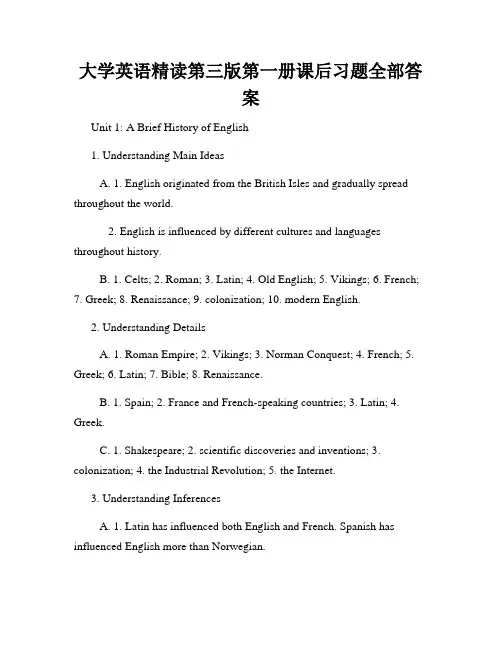
大学英语精读第三版第一册课后习题全部答案Unit 1: A Brief History of English1. Understanding Main IdeasA. 1. English originated from the British Isles and gradually spread throughout the world.2. English is influenced by different cultures and languages throughout history.B. 1. Celts; 2. Roman; 3. Latin; 4. Old English; 5. Vikings; 6. French;7. Greek; 8. Renaissance; 9. colonization; 10. modern English.2. Understanding DetailsA. 1. Roman Empire; 2. Vikings; 3. Norman Conquest; 4. French; 5. Greek; 6. Latin; 7. Bible; 8. Renaissance.B. 1. Spain; 2. France and French-speaking countries; 3. Latin; 4. Greek.C. 1. Shakespeare; 2. scientific discoveries and inventions; 3. colonization; 4. the Industrial Revolution; 5. the Internet.3. Understanding InferencesA. 1. Latin has influenced both English and French. Spanish has influenced English more than Norwegian.B. 1. The French-speaking Normans ruled England after the Norman Conquest. French vocabulary entered English as a result.C. 1. The colonization of America and the spread of the British Empire promoted the use of English worldwide.4. Understanding VocabularyA. 1. E; 2. E; 3. C; 4. D; 5. B; 6. C; 7. A; 8. E; 9. B; 10. D; 11. C; 12. A;13. A; 14. C; 15. D; 16. B.B. 1. evolution; 2. consolidation; 3. influx; 4. prosperity; 5. dominance;6. expansion;7. fluctuations;8. prevalence.Unit 2: Cultural Differences and Cultural Shock1. Understanding Main IdeasA. 1. Cultural differences can lead to misunderstandings and conflicts.2. Cultural shock is a common experience for people in a new cultural environment.B. 1. cultural differences; 2. culture shock.2. Understanding DetailsA. 1. The way people greet each other; 2. Personal space; 3. Eye contact; 4. Time orientation.B. 1. etiquette; 2. gestures; 3. customs; 4. lifestyles; 5. values.3. Understanding InferencesA. 1. Expectations and behaviors vary across different cultures.B. 1. It is essential to understand and adapt to a new culture to avoid misunderstandings and conflicts.4. Understanding VocabularyA. 1. C; 2. A; 3. E; 4. C; 5. D; 6. B; 7. E; 8.B.B. 1. perception; 2. encounter; 3. adapt; 4. reverse; 5. undergo.Unit 3: The Beginnings of Isolation1. Understanding Main IdeasA. 1. The narrator's solitude on the island gives him a sense of freedom and empowerment.2. The narrator is concerned about the presence of "wild things" on the island.B. 1. solitude; 2. wild things.2. Understanding DetailsA. 1. The narrator occupies himself with building, exploring, and observing nature on the island.B. 1. The narrator feels like the "king" of the island and enjoys the freedom it brings.2. The narrator is cautious about the "wild things" and their potential threat to him.3. Understanding InferencesA. 1. The narrator's newfound solitude allows him to escape the restrictions and expectations of society.B. 1. The narrator's isolation might lead to psychological challenges and fear.4. Understanding VocabularyA. 1. A; 2. D; 3. B; 4. E; 5. C; 6. D; 7. A; 8.B.B. 1. solitude; 2. companionship; 3. survival; 4. vulnerability.。
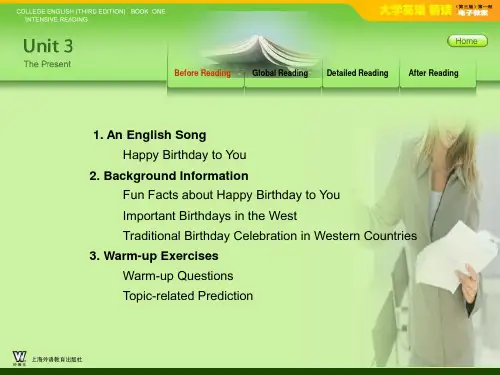
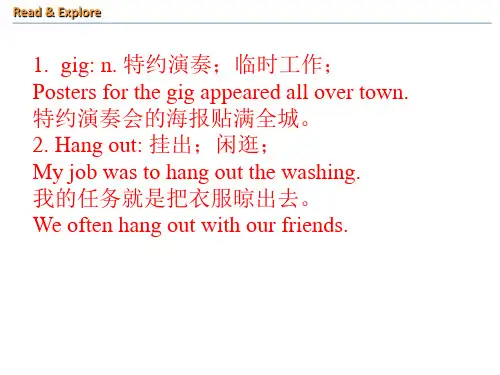
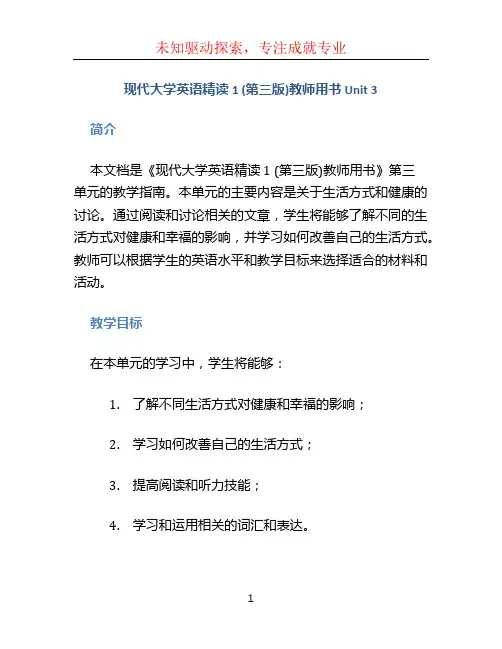
现代大学英语精读1 (第三版)教师用书 Unit 3简介本文档是《现代大学英语精读1 (第三版)教师用书》第三单元的教学指南。
本单元的主要内容是关于生活方式和健康的讨论。
通过阅读和讨论相关的文章,学生将能够了解不同的生活方式对健康和幸福的影响,并学习如何改善自己的生活方式。
教师可以根据学生的英语水平和教学目标来选择适合的材料和活动。
教学目标在本单元的学习中,学生将能够:1.了解不同生活方式对健康和幸福的影响;2.学习如何改善自己的生活方式;3.提高阅读和听力技能;4.学习和运用相关的词汇和表达。
教学材料本单元的教学材料包括:1.主题文章:《健康的生活方式》2.辅助材料:有关健康和生活方式的图片、表格和图表等;3.练习题和讨论问题。
教学步骤引入话题在引入话题时,可以使用图片或简短的视频来引起学生的兴趣。
可以展示一些健康的生活方式,比如锻炼、健康饮食、良好的睡眠等。
引入之后,可以提问学生一些相关的问题,例如:•你认为健康的生活方式对我们的身体和心理健康有什么影响?•你觉得你自己的生活方式健康吗?为什么?阅读文章学生阅读主题文章《健康的生活方式》。
在阅读之前,可以提前让学生阅读文章的标题和题目,以激发他们对该主题的兴趣。
学生可以自己阅读,或者分成小组讨论后再阅读。
讨论问题学生在阅读完文章后,可以回答一些与文章内容相关的问题。
这些问题可以涉及到文章的主要论点、观点和作者的意图等。
在讨论中,鼓励学生互相交流和表达自己的意见。
一些可能的讨论问题包括:1.文章中提到的几种生活方式对健康和幸福的影响有哪些?2.根据文章的建议,你觉得如何改善自己的生活方式?3.你在文章中有没有发现和你现在的生活方式有相似之处或者不同之处?4.你认为健康的生活方式对年轻人和老年人有何区别?词汇和表达根据学生的英语水平和需要,教师可以选择一些相关的词汇和表达进行教学。
可以通过例句、练习题和角色扮演等方式来帮助学生巩固所学内容。
一些可能的词汇和表达包括:•healthy lifestyle 健康的生活方式•balanced diet 均衡饮食•regular exercise 经常锻炼•stress management 压力管理•good sleep quality 良好的睡眠质量练习和作业根据教学目标和学生的能力,可以设计一些练习题和作业来帮助学生巩固所学内容。

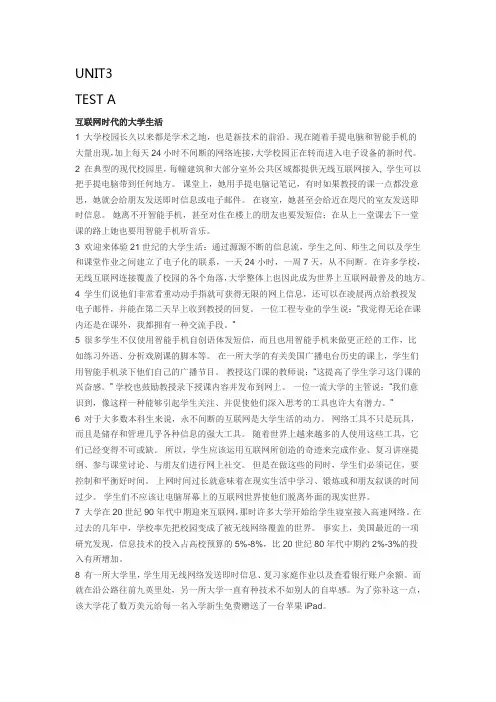
UNIT3TEST A互联网时代的大学生活1 大学校园长久以来都是学术之地,也是新技术的前沿。
现在随着手提电脑和智能手机的大量出现,加上每天24小时不间断的网络连接,大学校园正在转而进入电子设备的新时代。
2 在典型的现代校园里,每幢建筑和大部分室外公共区域都提供无线互联网接入, 学生可以把手提电脑带到任何地方。
课堂上,她用手提电脑记笔记,有时如果教授的课一点都没意思,她就会给朋友发送即时信息或电子邮件。
在寝室,她甚至会给近在咫尺的室友发送即时信息。
她离不开智能手机,甚至对住在楼上的朋友也要发短信;在从上一堂课去下一堂课的路上她也要用智能手机听音乐。
3 欢迎来体验21世纪的大学生活:通过源源不断的信息流,学生之间、师生之间以及学生和课堂作业之间建立了电子化的联系,一天24小时,一周7天,从不间断。
在许多学校,无线互联网连接覆盖了校园的各个角落,大学整体上也因此成为世界上互联网最普及的地方。
4 学生们说他们非常看重动动手指就可获得无限的网上信息,还可以在凌晨两点给教授发电子邮件,并能在第二天早上收到教授的回复。
一位工程专业的学生说:“我觉得无论在课内还是在课外,我都拥有一种交流手段。
”5 很多学生不仅使用智能手机自创语体发短信,而且也用智能手机来做更正经的工作,比如练习外语、分析戏剧课的脚本等。
在一所大学的有关美国广播电台历史的课上,学生们用智能手机录下他们自己的广播节目。
教授这门课的教师说:“这提高了学生学习这门课的兴奋感。
”学校也鼓励教授录下授课内容并发布到网上。
一位一流大学的主管说:“我们意识到,像这样一种能够引起学生关注、并促使他们深入思考的工具也许大有潜力。
”6 对于大多数本科生来说,永不间断的互联网是大学生活的动力。
网络工具不只是玩具,而且是储存和管理几乎各种信息的强大工具。
随着世界上越来越多的人使用这些工具,它们已经变得不可或缺。
所以,学生应该运用互联网所创造的奇迹来完成作业、复习讲座提纲、参与课堂讨论、与朋友们进行网上社交。
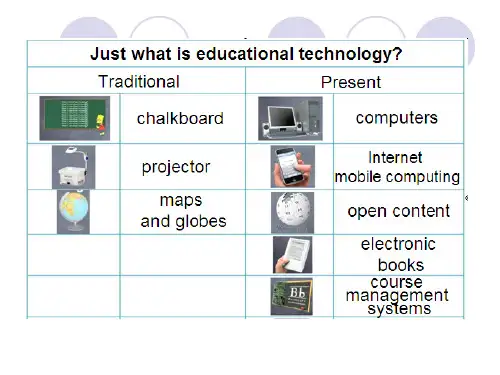

奥黛丽赫本——人间天使1 Audrey Hepburn thrilled audiences with starring roles in noteworthy films like Breakfast at Tiffany's, Sabrina, Roman Holiday, My Fair Lady, War and Peace, and Always.奥黛丽赫本在《蒂凡尼的早餐》、《龙凤配》、《罗马假日》、《窈窕淑女》、《战争与和平》和《直到永远》等出色电影中主演的许多角色让观众为之陶醉。
2 Despite her success in the film domain, the roles she most preferred portraying were not in movies. She was an exemplary mother to her two sons and a UNICEF (the United Nations International Children's Emergency Fund) Ambassador of Goodwill serving victims in war-torn countries.尽管在电影界获得成功,但她最愿意塑造的角色却并不在影片中,而是做两个儿子的模范母亲和联合国儿童基金会亲善大使,为饱受战争蹂躏的人们服务。
3 As a young girl during the Nazi occupation of her native Holland, Audrey Hepburn was aware of the brutality, death, and destruction of war. She was hungry and malnourished, as her family was bankrupted as a result of the invasion. Audrey's father abandoned the family, and two of her uncles were taken captive and killed. Audrey was grabbed off the street by Nazis and placed in line to be sent to a work camp. When the guards glanced away she darted off, barely escaping, and huddled in a cold, foul basement full of rats.作为一名在纳粹占领下的祖国荷兰生活的小女孩,奥黛丽?赫本清楚战争所带来的野蛮、死亡和破坏。
Part II key to exercisesSection APre-reading activities1.Traditional classroom:. Advantages: more direct communication between the teacher and students; a better learning atmosphere.. Disadvantages: little interaction either among students or between students and the teacher; the teacher tending to dominate the class; writing on blackboard reducing efficiency.Multimedia learning:. Advantages: more vivid teaching materials;. disadvantages: too many distractions with too many pictures and videos in multimedia classrooms.Studying online:. advantages: being able to choose when and what you want to learn; easy access to the wide range of online information.. disadvantages: making it easier for students to copy answers from the Internet; lack of face-to-face communication between the teacher and students; the possibility for students to develop Internet addiction.2. . I prefer the multimedia way of learning. A multimedia classroom is vivid with teaching materials presented in different ways: slides, pictures, and even movies. Compared with a traditional classroom, a multimedia classroom is more interesting.. To be frank, I prefer to study online. In this way I can manage my own time. I can have my own priorities and do things at my own pace. It is simply what I want.3. . Yes. The Internet is indispensable in teaching and learning nowadays. It is hard to imagine what it would be like without the Internet. We would have no easy or quick way to learn about the latest development of teaching and learning. We would miss the many interesting online courses; we couldn’t communicate effectively with teachers after class. We just can’t afford to lose the Internet.. No. teaching and learning had been carried out long before the Internet came into being. And people did just as well without the Internet or the computer. It is true that the Internet makes teaching and learning more convenient and more efficient, but it is by no means indispensable. I’m sure we can still teach or learn without the Internet.Reading comprehensionUnderstanding the text1.1. A fleet of laptops, smartphones and Internet connectivity 24 hours a day.2. wireless Internet access anywhere and anytime on campus.3. because smartphones could draw students’ attention and encourage sophisticated thinking.4. because too much time online can mean too little time I real-life studying or exercising or visiting with friends. If we spend too much time online, we will be cut off from the real world.5. they used the money to wire dorms with high-speed connections and equip their campuses with Wi-Fi networks.6. Because the university was afraid that it’s technology was not as advanced as that of other universities, it gave away free Apple iPads to compensate for its inferiority in this aspect.7. If a university can’t keep up with the rest f the world, or if it can’t provide high-bandwidth information as expected, it will be at a competitive disadvantage.8. it is mainly because they want to provide students with the most advanced free system.Critical thinking21 .Yes, I think so. Internet access is a must on campus. We students need the Internet to do research for our study, to obtain information to broaden our knowledge of the world, to communicate with family and friends, and to enrich our lives in our spare time.. No, I don’t think so. There are many potential disadvantages if Internet access is so easily accessible on campus. Some students may waste too much time I playing online games or chatting online, be tempted to visit “unhealthy” websites, or even become Internet-addicted and neglect their study.2 .It sounds like an awful idea to me. Obtaining knowledge is only part of learning. Learning not only gives us a wealth of knowledge, it also provides us with great vision, strong principles, social abilities, good manners, interpersonal skills and many more valuable attributes. This obviously cannot be realized by learning at home only with the computer..I think it is a good idea that students can study at home via the Internet in the future. Learning would become more flexible and accessible. This way, college education could become available to many more people, old or young, near or far, healthy or handicapped.3 . The Internet and smartphones have become an indispensable part of our daily life because they don’t cost much and they make communication much more convenient. We can talk to people, or leave them messages almost anywhere and anytime. And very often we will get responses in no time.. With the Internet and smartphones becoming more and more popular, we are forgetting how to write with a pen or how to talk with people face to face. The more we use the Internet and smartphones, the less we meet our friends in real life. Even when friends meet face to face, instead of talking with each other, they all look at their smartphones, checking email or posting something on WeChat.4 .Life would be unimaginable without the Internet or smartphones. I depend on them to do everything, from study to communication, from shopping to entertaining. Without the Internet, the backing systems, the communications systems, in fact all key aspects closely related to peoples’ life will collapse. Life without the Internet would be terrible and simply unimaginable. .Actually, I wouldn’t mind having a life without the Internet or smartphones. Without them, I would meet my family and friends face to face and spend more quality time together. I might take up some interesting hobbies or try something new. So, without them life might become evenmore colorful.Language focusWords in use3petitive2.transform3.typical4.response5.adopted6.focusedpensate8.analyze9.regulate10.estimateword building4Words learned new words formed -ry sceneryscene machinery-ivedetective detectcompare comparative explode explosive represent representative-izeModern modernize Character characterize Special specialize Computer computerize Summary summarize51.scenery2.machinery3.summarize4.specializes5.massive6.detect7.representative(s)8.characterizeparative10.modernize11.explosiveputerizedbanked cloze61J 2H 3L 4N 5F 6I 7E 8A 9C 10OExpressions in use71.fired off2.keep up with3.set up4.account for5.stand out6.add to7.take the lead8.at a disadvantage9.in large part10.visit withstructured writing9It is not uncommon to see teenagers smoking today. Some of them smoke because of peer pressure. When they see some of their friends smoking, they feel the pressure to try it out in order to “fit in”with the crowd. Some other teenagers smoke because they want to imitate adults or appear to be mature. Teenagers like to imitate their favorite stars and adults around them. So, parents who smoke may set a bad example for their children. In conclusion, the causes of teenager smoking can be attributed to peer pressure and their intention to look like adults.Translation10伦敦地铁是英国的一个快速交通运输系统,服务于大伦敦的大部分地区。
大学英语精读第三版(上海外语教育出版社董亚芬主编)第一册Book1 Unit1答案1)e2)g3)j4)a5)b6)i7)c8)d9)h10)f1) handling2) summarized3) process4) absorb5) are bound to6) feel free7) for instance8) strategies9) complained10) has committed to memory11) Nevertheless12) rely on13) Apart from14) command1) over and over again2) at a time3) put it into practice4) watching out for5) by no means6) concentrate on7) In addition t8) in detail1)action2)employ3)announce4)examination5)communication6)express7)compose8)improvement9)concentration10)management11)consider12)motivate13)development14)movement15)discuss16)operate17)division18)production19)educate20)repeat1) additional2) add3) addition4) addition1) effectively2) effect3) effective4) effect1) helpful2) help3) helpless4) help5) helplessly6) helpfully7) helpful1) reliant2) reliable3) reliance reliable4) relies5) reliably6)1) repetition2) repeating3) repeatedly4) repeated5) repetition1) In my opinion2) According to Mary3) In our opinion4) According to today's papers5) In most doctors' opinion According to most doctors1) Shakespeare was not only a dramatist but also an actor.2) Miss Crain not only took me home in her car, but also came the next day to see if I had recovered.3) Hainan Island attracts tourists not only in winter but also in summer.4) There is always a black market not only in Britain, but also in other European countries.5) At the Athens Olympics in 2004, Liu Xiang not only won a gold medal in the 110-meter hurdles, but also broke the Olympic record.1) It is true that your sentences are all grammatically correct, but they don’t make any sense.2) It is true that they lost that battle, but they still went on fighting.3) I t is true that Tom’s very clever and hardworking, but I still don’t think he is the right person for the job.4) It is true that learning English is by no means easy, but we can make the task easier by using some learning strategies.1) strategies2) frequently3) over and over again4) commit to memory5) acquaintance6) watch out for7) communicate8) process9) opportunities10) rely on11) put into practice12) absorbed1) if2) about3) it4) know5) up6) as7) addition8) even9) into10) other11) for12) while1) memorize2) a matter of3) taught4) shelf5) realize6) written7) idiomatic8) join in9) difference10) gain a good command翻译1) 史密斯太太对我抱怨说,她经常发现与自己十六岁的女儿简直无法沟通。
新视野大学英语视听说教程第三版第一册练习答案Unit 1 Traces of the pastListe ning to the worldShari ng2. 1) busy 2)frie nds 3) uni versity 4) social life3. AEBDCF4. 1) danced 2) view of the river 3) fun 4) drink 5) west 6) delicious meal 7) house 8) televisionListe ning2. 1) 1962 2) fourth 3) 1990 4) 19963. 1) teacher 2) cleaned houses 3) lost 4) visited 5) work 6) his wife 7) in his own wordsViewi ng1. 1) A famous ballet dancer 2) Havana 3) His home country, family and childhood.2. a c h f d e g bSpeak ing for com muni catio nRole-play1. Isabel went for a walk with her boyfriend while Marek played football and cleaned his flat.2. 1) It was great. 2) He'a football player. 3) It was really beautiful.3. 1,3, 5, 7 ,10Further practice in liste ningShort conversations BABDDLong conv ersati on DBCDPassage 1 DDBAPassage 21) programs 2) very 3) decisions 4) doing laundry 5) Obviously6) choices 7) ruining 8) get used to 9) opportunities 10) step backUnit 2 A break for funListe ning to the worldShari ng2. 1) once a month 2) Not very often 3) once or twice 4) once a week 5) once every month 6) every fortnight3. 1) romantic 2) great 3) recommend 4) action 5) collection 6) real life 7) scenes 8) fantastic4. c d a bListe ning2. bion de, blue, dark, masculi ne3. Woman 1: Sea n Conn ery; Woman 2: Gael Garcia Bernal a nd Will Smith;Man 1: Judi Dench; Man 2: Scarlett Johansson4.Viewi ng1.1) It is a music festival2) It is held in the Isle of Wight every September.3) I think people can enjoy the music at the festival and have fun with their families and frie nds.2. 2, 4, 63. 1) garden; baby and wife; 2) traditional values; like; 3) being togetherSpeak ing for com muni catio nRole-play1.1) fell like 2) What do you recomme nd 3) how about 4) What 'it about5) Who'in it 6) Do you thi nk 7) Why don'twe2. 1,4, 5, 7, 8, 9, 10Further practice in liste ningShort conversations DBCADLong conv ersati on DCBCPassage 1 ABACPassage 21) comic 2) traffic 3) constantly 4) available 5) took part in6) attracted 7) audienee 8) free of charge 9) put forward 10) embraceUnit 3 Life mome ntsListe ning to the worldShari ng2.1) because theresso much to do2) H e has been to lots of interesting places but ther e always something new to experie nee3) How do you feel about London?3. A C H B G F D E4. 1) excit ing 2) amaz ing con cert 3) in credible 4) the theater 5) the best place6) different 7) compared to 8) play football 9) interesting things 10) the best thi ng 11)tickets 12) culture and sportListe ning2. a d h e b g c f3. 1) In Australia 2) Because he decided to go further after he realized he didti know where he was 3) Really frighte ned 4) Don 'move, and dontlook at the dogs 5) A tree Viewi ng2. Francesco is an architect and historian. He visits the island of Crete and goes to a local wedd ing.3. 2,44.1) Crete is the biggest island in Greece.2) She is a little nervous.3) All the women in the village are helping prepare the wedding feast.4) About 1500 people.5) They give money as gifts.6) There is so much to see, do and eat at the weddi ng. Fran cesco is overwhelmed by all that.Speak ing for com muni catio nRole-play1.2. 1) It' 2) there 3) leave a message 4) call 5) speak 6) moment 7) ring8) number 9) this 10) picking upFurther practice in liste ningShort conversations CCBDALong conv ersati on BCADPassage 1 CABCPassage 21) mountainous 2) frightened 3) took place 4) vanish 5) occurred6) massive 7) caught 8) keep us away from 9) grateful 10) in advaneeUnit 4 Getti ng from A to BListe ning to the worldShari ng2. A: bus B: car C: walking D: walking, the tube E: bus, walking F: bike3. 1) fresh air 2) avoid holes 3) think about 4) dream 5) looking out of the win dow 6) an accide nt4. E F A D B C5. B C A D F E6. 1) by underground 2) go to school by bus 3) about an hour 4) listen to music5) look out of the windowListe ning1. B C A4. 1) 1962 2) leave their cars at home 3) public transport 4) build 5) keep in good condition 6) 1948 7) got in and drove away 8) engineering problem 9) too heavy 10) strong 11) private 12) difficult to fly 13) traffic problem Viewi ng2. 1) queuing 2) making phone calls 3) pizza 4) playing outside 5) chess3. A: 3,5 B: 2 C: 1,6 D: 44. 1) airport managers 2) relax 3) pass the time 4) midnight 5) their flight 6)300 7) 319 8) 5005. 1) Beijing 2) terrible 3) 7 p.m. 4) a computer problem in the control tower 5) can celled 6) ano ther flight 7) queue/wait 8) sleep ing everywhere at the airport9) took off 10) 3 o 'lock this morni ngSpeak ing for com muni catio nRole-play1. 1) tied up; customer 2) 20; coffee 3) delayed; cow; stations2. 1) all right 2) mean 3) not acceptable 4) won ' 5) really 6) not my fault3. Acceptable: 3,4,6,7Further practice in liste ningShort conversations CBDDALong conv ersati on CBDDPassage 1 CADAPassage 21) Gradually 2) enabled 3) vehicles 4) dates back to 5) As a result6) thoroughly 7) capacity 8) turn 9) automobiles 10) thanks toUnit 5 Relax and exploreListe ning to the worldShari ng2. adventure holidays, beach holidays, city breaks, activity holidays, swimming, skii ng, relax ing holidays3. 1,4, 5, 7, 104. 1) relaxing 2) fantastic 3) lovely 4) Amazing 5) thoroughly enjoyed 6)Lovely 7) fan tasticListe ning3. 1) more comfortable 2) Plane 3) faster 4) In a hotel 5) more comfortable 6) In an apartment 7) more expensive 8) Go sightseeing 9) Go sightseeing 10) more in teresting 11) In summer 12) better 13) hotter 14) hot weather 15) In spri ng 16) more crowded 17) Go to a restaura nt 18) quieter 19) Go to a restaura nt 20) quieter 21) more relax ing 22) A mon th 23) A monthViewi ng1. 1) La Boca 2) Football a nd polo 3) Arge ntinian beef2. c a f d e b3. 1) widest; cuts through 2) football; his career 3) famous; 1800s 4) apparently5) 80 6) fantastic meat 7) vegetables 8) family and friends; wonderful momentsSpeak ing for com muni catio nRole-play1. 2,4,5,82. 1) Could I have 2) can we have 3) that 4) French 5) I'd like 6) The sameFurther practice in liste ningShort conversations ADACCLong conv ersati on DCDCPassage 1 DBACPassage 21) celebrate 2) provide us with 3) sticking to 4) challenges 5) anticipating6) portions 7) stuff 8) take hold of 9) effective 10) strategiesUnit 6 Wit and fitListe ning to the worldShari ng2. 1) exercise 2) full-time 3) running3. 1, 54. D G A E B C F5. 1) a sweet tooth 2) sweet 3) coffee 4) chocolate 5) Eating late 6) regularly 7) too much 8) fast food 9) far too many 10) cakeListe ning3. 1) eating problems 2) replace normal food 3) eat only food pills 4) taste different 5) change its flavor 6) become com mon4. 2Viewi ng1. Play: basketball, badminton, rugby, cricket, volleyball, squash, football, tennisGo: surfing, horse racing, jogging, cycling, swimming, rollerblading, skiing2. Corbett finds it difficult to keep calm probably because he is beaten by Barker, who has n ever played squash before.3. C A C D D4. BBBCC BCBCCSpeak ing for com muni catio nRole-play1. d b f e a c2. 1) tea and coffee 2) one small cup 3) pain killers 4) three times a day 5) Foot pain 6) worry aboutFurther practice in liste ningShort conversations CBDBDLong conv ersati on CBAAPassage 1 BDBAPassage 21) pressures 2) disappear 3) compromise 4) alcohol 5) intense6) interferes with 7) undermine 8) pay attention to 9) suffers from 10) competitiveUnit 7 Weird, wild and won derfulListe ning to the worldShari ng2. 1, 3, 43. CAFDEB4. 1) Snakes 2) the end 3) hate 4) scared of 5) afraid of 6) horses 7)frighten 8) scares 9) memories 10) sharks 11) unknownListe ning3. 1) encir. probs. 2) ?6 bil. 3) 2050 4) ?9 bil. 5) popu. 6) probs4. 1) 3 2) probs. 3) water 4) < 5) 4.52L 6) 600 L 7) ? 8) diffi. 9) animals 10) T 11) J 12) Rainf. 13) 150,000 k m214) the weather 15) T16) T17) T Viewi ng2. 2, 33. CCAA4. 1) beautiful 2) magical 3) lovely 4) fantastic 5) happy 6) astonishingSpeak ing for com muni catio nRole-play2. BAA3. e a c b d f gFurther practice in liste ningShort conversations CABDDLong conv ersati on DCDAPassage 1 CCACPassage 21) participated in 2) access 3) treme ndous 4) curre ntly 5) in credible6) accompany 7) remarkable 8) amazing 9) catching a glimpse of 10) looking forward toUnit 8 Money mattersListe ning to the worldShari ng2. CEBADF3. BBABBA4. dress, book, han dbad, trousers, train ers, shoes, coat, sun glasses, tops, skirts, teleph oneListe ning1. CABD3. chew ing gum, the mobile phone, the iPod and Mono poly4.4. 1,4, 5, 6, 7Viewi ng2. 1) early 30s; 6 billi on 2) computer scie nee stude nts 3) tour guide; in the group4) searchi ng the Internet 5) 2000; successful bus in ess 6) fastest grow ing; most profitable3. 4,5Speak ing for com muni catio nRole-play1. CBABC2. SSCCS CSSCCFurther practice in liste ningShort conversations BDCBDLong conv ersati on BCADPassage 1 CDBDPassage 21) evide nee 2) enhance 3) in terviewed 4) rated 5) took into acco unt6) forecast 7) emerged 8) was related to 9) adapt themselves to 10) original。
Unit1 奔向更加光明的未来1 下午好!作为校长,我非常自豪地欢迎你们来到这所大学。
你们所取得的成就是你们自己多年努力的结果,也是你们的父母和老师们多年努力的结果。
在这所大学里,我们承诺将使你们学有所成。
2 在欢迎你们到来的这一刻,我想起自己高中毕业时的情景,还有妈妈为我和爸爸拍的合影。
妈妈吩咐我们:“姿势自然点。
” “等一等,”爸爸说,“把我递给他闹钟的情景拍下来。
” 在大学期间,那个闹钟每天早晨叫醒我。
至今它还放在我办公室的桌子上。
3 让我来告诉你们,一些你们未必预料得到的事情。
你们将会怀念以前的生活习惯,怀念父母曾经提醒你们要刻苦学习、取得佳绩。
你们可能因为高中生活终于结束而喜极而泣,你们的父母也可能因为终于不用再给你们洗衣服而喜极而泣!但是要记住:未来是建立在过去扎实的基础上的。
4 对你们而言,接下来的四年将会是无与伦比的一段时光。
在这里,你们拥有丰富的资源:有来自全国各地的有趣的学生,有学识渊博又充满爱心的老师,有综合性图书馆,有完备的运动设施,还有针对不同兴趣的学生社团——从文科社团到理科社团、到社区服务等等。
你们将自由地探索、学习新科目。
你们要学着习惯点灯熬油,学着结交充满魅力的人,学着去追求新的爱好。
我想鼓励你们充分利用这一特殊的经历,并用你们的干劲和热情去收获这一机会所带来的丰硕成果。
5 有这么多课程可供选择,你可能会不知所措。
你不可能选修所有的课程,但是要尽可能体验更多的课程!大学里有很多事情可做可学,每件事情都会为你提供不同视角来审视世界。
如果我只能给你们一条选课建议的话,那就是:挑战自己!不要认为你早就了解自己对什么样的领域最感兴趣。
选择一些你从未接触过的领域的课程。
这样,你不仅会变得更加博学,而且更有可能发现一个你未曾想到的、能成就你未来的爱好。
一个绝佳的例子就是时装设计师王薇薇,她最初学的是艺术史。
随着时间的推移,王薇薇把艺术史研究和对时装的热爱结合起来,并将其转化为对设计的热情,从而使她成为全球闻名的设计师。
中南财经政法大学武汉学院外语系《大学英语1》(专科)课程教案Teaching Plan for College English (Book 1) Foreign Languages Department of Wuhan College, ZNUEL任课教师签名:Lecture NotesBefore Reading:Background Information Related to the Text1 Fun Facts about Happy Birthday to You2 Important Birthdays in the West3 Traditional Birthday Celebration in Western CountriesDirections: TaskSummarize the traditional ways to celebrate birthday in the west.Saying “Happy Birthday”Opening the presentsFood and drinks are servedTurning off the light and light the candlesSinging birthday song and make a wishThe birthday person blows out the candles on the cakeThe birthday person cuts the cakeThe guests wish the birthday person “happy birthday” again and leaveWarming-up1.DiscussionTeacher: Before we study the text, let me ask you some questions.1) Do you often call your parents? What do you usually talk about with your parents on the phone?2) Do you know your parent’s birthdays? What do you usually do to celebrate their birthdays?3) Suppose your mother were fifty tomorrow. What birthday present would you send her?2.Introductory RemarksWhat or what present would an old lady expect from her daughter for her eightieth birthday? It is the old lady’s eightieth birthday. She is very excited. She gets up early and puts on her best dress. She wishes her daughter would come to see her, though deep down she has her doubts. But one thing is certain: She will get a present from her daughter anyway. So she waits with eagerness. Finally the postman comes; the old woman, however, does not receive the parcel she has expecting, but a printed birthday card along with a cheque. She is so disappointed, so hurt, that she tears the cheque into small pieces.The story, simple as it is, shows us some aspects of the family relationship in Western society and gives us an insight into the frustrations lonely old people suffer.Comprehension of the Text1. True or False JudgmentDirection:The following True / False exercise is designed to help the students to obtain a general idea of the text. The students are expected to repeat a statement if it is true, and to correctthe statement if it is false.1) The old lady got up early that day simply because she was in the habit of doing so. (F)(She wanted to be ready for the post)2) The old lady had two daughters: Myra, the one she was proud of, and Enid, the one she loved. (T)3) The old lady was proud of Myra as she had got a medal for her work for the aged. (T)4) Enid worked as a school teacher and lived with her mother until she died. (T)5) In the past two years, Myra seldom came to see her mother, but she wrote to her quite often. (F) (She seldom wrote.)6) The old woman was sure that Myra would come to see her since eighty was a special birthday. (F) (She thought Myra might come; she was sure Myra would send a present even if she didn’t come.) 7) Mrs. Morrison the help, and neighbors were particularly kind toward her that day; they either gave her some lovely presents or invited her to an afternoon tea. (T)8) The boy downstairs ran to the gate and got the post for her. (T)9) As soon as she saw the envelope in Myra’s writing, she knew that her daughter would not send her any presents. (F)(She was still hopeful that the parcel would come by parcel-post.)10) After she read what her daughter wrote on the printed birthday card, she felt so hurt that she tore the cheque that came along with the card into little bits. (T)2. Answer the following questions based on the text:1) What was the special occasion? How old was the old lady?Answer: It was the old lady’s birthday.2) Did Myra and her husband often come to see the old lady?3) What had happened to Enid?4) Whom did the old lady love more, Myra or Enid? Why?5) Why was the old lady proud of Myra?6) The old lady lived alone. But do you think she was very lonely? Why or why not?7) Who was Jim? Was he still alive?8) Who was Jonnie? How old was he? What do you think of him?9) Why did the old lady tear the cheque into pieces?10) The story tells us that Myra had won a medal for her work with the old people. Do you think she deserved the medal? Do you think she really cared about old people? Why or why not?Text Organization1. What type is the text?A. narrationB. expositionC. descriptionD. argumentation Key (A)2. A narration is usually organized in order of . (time / sequence)3. Discourse AnalysisDiscourse Analysis of the Story:Directions:Scan the text and list the basic elements for the story.Words Scanning1) Directions: Scan the text an d use some adjectives to describe her two daughters’and neighbors’ attitudes to the old lady.Johnnie, Mrs. Morrison & Mrs. Grant: helpful, kind, warm-heartedEnid: considerate, thoughtfulMyra: thoughtless2) Directions:Scan the text again and use some phrases describing the changes of the old lady’s actions and feeling.expectation: get up early; be sure of something; put on best dress; might comeconcession: even if; send a presentanother expectation: two spots of color; excited like a child; stand by the window, watching disappointment: feel a pang of disappointmentconcession: the parcel too large to come by the postcomplete disappointment: reluctantly; a card; a piece of paperFurther UnderstandingFor Part 1& Part 22. Make up a dialogue between the old lady and one of her best friends. They talk through telephone about her birthday.Tip:A: Hello. Is this/that XXX?B: Yes, may I ask who this is?A: … Happy birthday to you!B: Thank you.A: …For Part 3: Group Discussion1) Why did the old lady feel so hurt when she got the check from her daughter?A check is impersonal. It symbolizes obligation but with no sincere feelings. Myra regarded her work with strangers as more important than the happiness of her own old mother. It seems that everyone in the neighborhood was aware that the old woman’s 80th birthday fell on that day. They regarded it as an important occasion.2) How do you understand that blood is thicker than water?By saying “Blood is thicker than water”, we mean that family members or our relatives are more important than others (friends, neighbors, etc.). Not only should we be always considerate and helpful to our family members but also we should take the responsibility or obligation to make them happy.Detailed Reading1. They say that blood is thicker than water: It is said that family relationships are the strongest ones. 血浓于水(亲属关系最强有力);亲人要比外人亲。